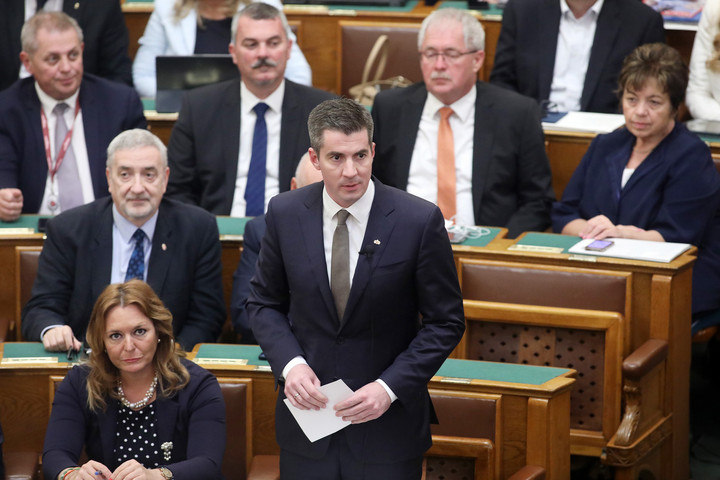The new government structure meets the expectations of the voters, the interests of the Hungarian nation, it is suitable for overcoming the challenges facing Hungary and the changes taking place in the world, the leader of the Fidesz faction stated on Tuesday in the Parliament during the combined debate of the bill on the list of ministries of Hungary.
Máté Kocsis, in connection with the proposal submitted by him and by Viktor Orbán (Fidesz), Zsolt Semjén (KDNP), Máté Kocsis (Fidesz), István Simicskó (KDNP) and Imre Vejkey (KDNP), highlighted that in the parliamentary election on April 3 Hungarian people voted for civilian government, they decided to maintain peace and security, support for families, and cut utilities and taxes. The new two-thirds authorization of the Fidesz-KNDP also speaks to this, and these must also be taken into account when forming the operation of the new government, he added.
He added that the voters also took a position in favor of the government keeping the measures to protect against inflation, the price caps. He recalled that, according to Prime Minister Viktor Orbán, the European people are facing many years that will present many unknown challenges.
He spoke about the Russian-Ukrainian war, indicating that Russian aggression is condemned by Fidesz-KDNP, but the war looks different from Záhony than it does from Brussels.
Máté Kocsis took a stand that the safety of the Hungarian people is the first and second most important task of the governing parties, helping those fleeing the war, and that this should also be the focus of attention in the government structure.
He said, according to the proposal, the new government will be formed with the following ministries: Ministry of Agriculture, Ministry of the Interior, Ministry of Construction and Investment, Ministry of National Defense, Ministry of Justice, Ministry of Culture and Innovation, Ministry of Foreign Affairs and Trade, Prime Minister's Cabinet Office, Prime Minister's Office, Ministry of Finance and Ministry of Technology and Industry.
According to Máté Kocsis, it has been proven many times throughout history that there is no successful Hungary without successful agriculture. Now this sector also has to face unprecedented challenges, he said, mentioning among the others the price increase on the world market and the energy market, as well as the war. He added that it is important to create a government and an agricultural ministry that prioritizes ensuring the domestic food supply, maintaining the competitiveness of the agricultural economy, and paying sufficient attention to ensuring quality.
He touched on the fact that on April 3, the voters also took a stand that Hungary should stay out of the war. Thus, one of the most important tasks of the new government will be to preserve peace and security, he said.
He said that the work organization of the Ministry of the Interior, the Ministry of National Defense and the Prime Minister must be strengthened, this justifies the reorganization proposals between law enforcement organizations.
According to the leader of the faction, recent years have proven that it is correct to handle foreign trade and foreign affairs as a single unit, and therefore the Ministry of Foreign Trade and Foreign Affairs is needed in an essentially unchanged form.
According to his description, the Ministry of Justice is still responsible for legislation, and performs the tasks that have been in its scope until now. He said that at the Ministry of Culture and Innovation, questions concerning the future are gathered, and here will be the tasks that are necessary for the implementation of a 21st century social policy.
He compared the Ministry of Technology and Industry to the Ministry of Innovation and Technology, with changed and expanded responsibilities. He added: domestic industrial development contributes to ensuring Hungary's self-sufficiency and competitiveness.
Máté Kocsis assessed that this structure largely depends on who it is filled with and what tasks, but considering the current political and social environment, no better government structure could be proposed.
On Tuesday, the Parliament adopted the law on the list of ministries, according to which eleven ministries will operate in the fifth Orbán government.
The proposal of Prime Minister Viktor Orbán and his fellow members of the ruling party, Zsolt Semjén, Máté Kocsis, István Simicskó and Imre Vejkey, was accepted by the parliament - in an exceptional procedure - with 124 votes in favor and 39 against.
Based on the legislation, the ministries of the future cabinet will be the following: Ministry of Agriculture, Ministry of the Interior, Ministry of Construction and Investment, Ministry of National Defense, Ministry of Justice, Ministry of Culture and Innovation, Ministry of Foreign Trade and Foreign Affairs, Prime Minister's Cabinet Office, Prime Minister's Office, Ministry of Finance, and Ministry of Technology and Industry.
The text of the law states that the Prime Minister's work organization is the Prime Minister's Cabinet Office, which includes the Prime Minister's Government Office as a government administrative work organization. The Ministry of Construction and Investment is created by separating from the Prime Minister's Office.
In the previous government cycle, there were ten ministries. The succession between former ministries is defined in a government decree. The legislation enters into force on the day following its promulgation.
According to the justification of the law, in accordance with the previous traditions of the civil side, it forms a government by deriving its composition and structure from the tasks of the four years ahead. The most important task of the future new government is to provide answers to the questions of the European economic crisis that have developed due to the war situation, which will enable Hungary to preserve the results it has achieved in recent years, the justification reads.
Source: Magyar Hírlap
Featured image: MH/Róbert Hegedűs












